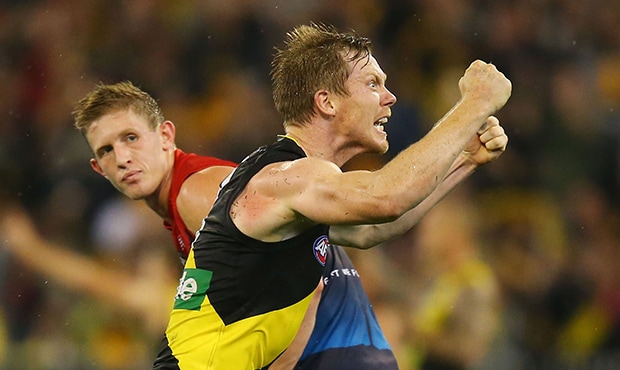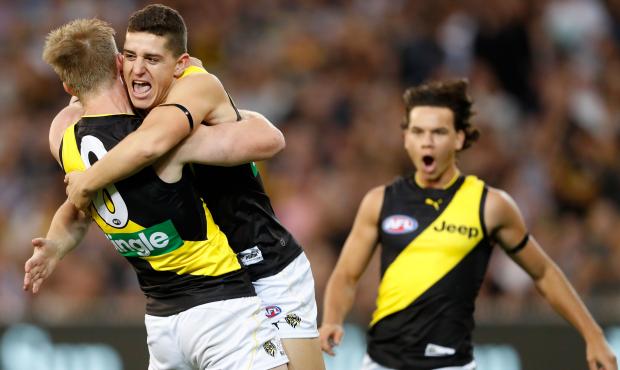THE SPOTLIGHT has always followed Jack Riewoldt. From his early emergence as a superstar goalkicker, to the on-field antics that saw his passion and exuberance misunderstood as petulance.
But something has changed in 2017. The spotlight has shone elsewhere at Punt Road Oval and Riewoldt has gone about his business quietly, playing a crucial role but with little fanfare.
His leadership appears natural, his passion is channelled in ways that help the team, and his success as a player can be measured by what those around him are doing, not only by his own goal tally.
He seems to have hit a sweet spot after years as a brilliant but volatile talent, and Richmond has benefitted immensely this year. How times have changed.
When Riewoldt arrived at Richmond at the end of 2006 as an energetic and spirited teenager from Tasmania, he earned the nickname 'Mozzie'.
The Tigers had conducted personality profiling on all of their players at the time, adopting a system previously used by the Brisbane Lions, the Australian Cricket team and the NRL's Brisbane Broncos.
Created by leading sports performance psychologist Phil Jauncey, players were put in a category and the Mozzie box was reserved for those who were talkative, social and high in energy. Riewoldt was "off the charts Mozzie".
"He was buzzing around all the time," said Craig McRae, who joined Richmond at the same time as Riewoldt as player development coach.
"That's why they started calling him the Mozzie. It was one of the profiles and it meant you were very social and high energy, and Jack certainly had all that. He was off the charts Mozzie.
"The more experienced guys, with the culture at the time, weren't sure how to take him, but his personality is really engaging and it didn't take long for the playing group to fall in love with him."
It is that personality that has made Riewoldt one of the game's most interesting and exciting players ever since 2009 when he established himself as a key forward with 32 goals.
When he won the Coleman Medal in 2010 with 78 goals, 'Jack' was a superstar of the competition and the king of the kids at Punt Road Oval.
But Riewoldt is now playing in the shadow of superstar Dustin Martin, and it is a dynamic that has meant a remarkable 2017 season, mostly played as a sole marking target in a small forward line, has been under-rated.
When the Tigers have kicked to a target inside 50 this season, Riewoldt has been it 31 per cent of the time. He has been targeted 211 times, with Jason Castagna the next most used (79).
Only Ben Brown (North Melbourne), Josh Kennedy (West Coast) and Tom Lynch (Gold Coast) have been targeted by their teams inside 50 at a higher rate.
It is a taxing role, but rival coaches talk about Riewoldt's football smarts as a key attribute in allowing him to present time and time again.
"He would be under a significant amount of physical pressure to present and create contests, but his footy smarts enable him to be efficient with his work," one rival coach told AFL.com.au.
Jack Riewoldt loves celebrating a goal. Picture: AFL Photos
Riewoldt's leadership with a group of young small forwards has also been a driving force behind the success of an unconventional attacking structure.
Voted into a three-man leadership group as joint vice-captain with Alex Rance, the 28-year-old has taken great pride in the success of the Daniel Rioli, Dan Butler and Castagna combination this season.
"He is forever thinking about them and how he can make them better, whether it's just an arm around them or the celebration after they kick a goal," McRae, who is now Richmond's VFL coach, said.
"There's no doubt his leadership has grown in the last 12 months.
"He didn't have a title previously and that didn't affect him. But now that he does have a title as vice-captain, in my eyes he has grown even more."
McRae remembers seeing leadership traits in Riewoldt when he first arrived at Richmond, but they were different.
He was a player in a hurry and he wanted to be a role model, often speaking up in meetings and finding ways to demonstrate good habits to his fellow development players.
He would slip up, though. McRae had 22 players in his development group, and he called in coaching great David Parkin to put them through a Level Two coaching course.
"The thought process was there'd be 22 other coaches with me and we'd be able to help each other," McRae said.
"Anyway, David Parkin comes in and as he does he stands at the front and he says to Jack, 'Why are you here, young fella? Why are you here?'
"Jack was in the front row and he says, 'Because 'Fly' (McRae) said it was on the schedule at 11 o'clock'. David looked at him and said, 'Think a little bit deeper son'."
Riewoldt has celebrated teammates' achievements as much as his own in 2017. Picture: AFL Photos
McRae's coaching path took him from Richmond to the Brisbane Lions in 2010, and then Collingwood from 2011-15.
He returned to coach the Tigers' VFL team for the 2016 season and sat back in those early weeks to watch the players he had developed early in their careers and see how they had come on.
"I saw how vocal and engaged in the group Jack was and thought, 'Wow, hasn't he matured. He's a guy who really is invested in others'," McRae said.
"I saw great quality in Jack and how he had really matured over that time.
"It's gone to a new level this year and his investment in the young small forwards has been unbelievable."
A past member of Richmond's coaching team, who had a key early role with Riewoldt, spoke about the emotion of game day and how it brings out a player's true colours.
For Riewoldt that used to manifest in arguments with umpires and occasionally teammates. His emotion stopped him playing the game and he had detractors.
Now his emotion is channelled towards supporting teammates and the only time it spills over is when an important goal is kicked and his face swells to the point it looks ready to explode.
"He is still an emotional person, but the high and lows on the rollercoaster are not as steep," the coach said.
Riewoldt is still the Mozzie that arrived from Tasmania in 2006, but he has matured and become more rounded while adding new traits to his profile, McRae said.
He will always be a player who wants the ball at big moments, but as a forward and a leader he has learned the value in following as Richmond hopes to write a finals fairytale.
"That's something I've seen this year," McRae said. "He's been able to see that difference between knowing when to drive the bus and when to sit at the back of it."


